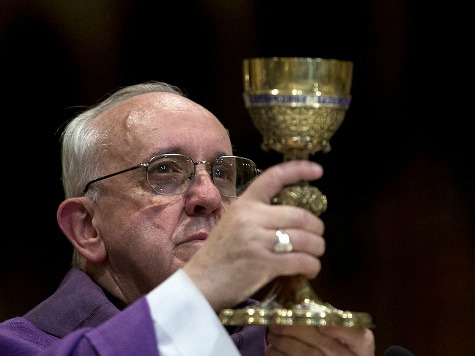In today’s whirlwind visit to Albania, Pope Francis emphasized religious liberty on several occasions, making it one of the key themes of his trip.
In his opening address this morning before the Albanian President and other civil and government officials, the Pope noted that defense of basic human freedoms is a necessary condition for development.
“Respect for human rights, among which religious freedom and freedom of expression stand out, is the preliminary condition for a country’s social and economic development,” the Pope said.
Francis also noted that when the dignity of the human person is respected and his or her rights recognized and guaranteed, “creativity and interdependence thrive,” and the “potential of the human personality is unleashed through actions that further the common good.”
In a carefully worded message, the Pope also made reference to recent armed conflicts waged in the name of religion, notably radical Islam. Mutual respect among religions is especially important, he noted, “in these times where an authentic religious spirit is being perverted and where religious differences are being distorted and instrumentalized.”
These distortions create “dangerous circumstances,” the Pope continued, leading “to conflict and violence.”
Later, in his homily during Mass, Pope Francis recalled Albania’s recent past under a ruthless atheist government. “In the recent past,” he said, “the doors of your country were also closed, locked by the chains of prohibitions and prescriptions of a system which denied God and impeded religious freedom.”
In this situation, those who were “afraid of the truth” did everything they could “to banish God from the hearts of men and women and to exclude Christ and the Church from the history of your country,” the Pope said.
Francis chose the unlikely country of Albania for his first European trip specifically for this reason, because it is an example of a land where different religions cohabit peacefully. The Albanian population is not predominantly Catholic, like many other European states, but Muslim. Muslims comprise some 60 percent of Albanians, while only 15 percent are Catholic.
“Albania is a country that has suffered so much,” the pope told journalists during his flight from Rome, “but it has managed to find peace between its different religions, which is a good sign for the world.”
Though the Vatican insisted it did not increase security for the trip, Albania’s police set up 29 checkpoints in downtown Tirana, where most of the pope’s activities were planned, including at the Mother Teresa square.
Albania also raised the police force alert to its highest level and mobilized special forces across the country in the face of warnings that Islamic State jihadists could be planning an attack on the Pope.
Today marks the second time a pope has visited Albania. The first was by Pope John Paul II in 1993, the year after communism collapsed there. He, too, lamented the totalitarian regime that had “sought to annihilate all religious expression in the name of radical atheism.”

COMMENTS
Please let us know if you're having issues with commenting.